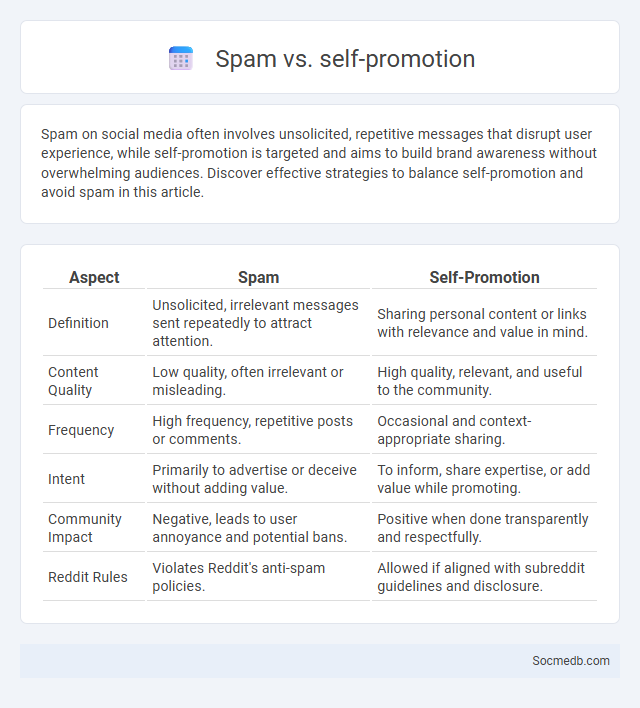
Photo illustration: spam vs self-promotion
Spam on social media often involves unsolicited, repetitive messages that disrupt user experience, while self-promotion is targeted and aims to build brand awareness without overwhelming audiences. Discover effective strategies to balance self-promotion and avoid spam in this article.
Table of Comparison
| Aspect | Spam | Self-Promotion |
|---|---|---|
| Definition | Unsolicited, irrelevant messages sent repeatedly to attract attention. | Sharing personal content or links with relevance and value in mind. |
| Content Quality | Low quality, often irrelevant or misleading. | High quality, relevant, and useful to the community. |
| Frequency | High frequency, repetitive posts or comments. | Occasional and context-appropriate sharing. |
| Intent | Primarily to advertise or deceive without adding value. | To inform, share expertise, or add value while promoting. |
| Community Impact | Negative, leads to user annoyance and potential bans. | Positive when done transparently and respectfully. |
| Reddit Rules | Violates Reddit's anti-spam policies. | Allowed if aligned with subreddit guidelines and disclosure. |
Understanding the Basics: Spam, Self-Promotion, and Rule Violations
Social media platforms enforce strict guidelines to prevent spam, which typically involves repetitive, irrelevant content intended to mislead or disrupt user experience. Self-promotion is allowed within boundaries, but excessive or unsolicited advertising can result in account restrictions or bans. Rule violations such as harassment, misinformation, and copyright infringement lead to content removal and possible suspension, emphasizing the importance of adhering to community standards for effective online engagement.
Defining Spam: Characteristics and Examples
Spam in social media consists of unsolicited, irrelevant, or repetitive messages designed to deceive or annoy users, often posted by bots or malicious accounts. Common characteristics include excessive frequency, promotional content without user consent, and links to phishing sites or malware. Recognizing these traits helps protect Your online presence from spam, ensuring safer interactions and authentic engagement.
What Constitutes Self-Promotion Online?
Self-promotion online involves strategically sharing your skills, achievements, and personal brand across social media platforms to enhance visibility and credibility. Your posts, comments, and content creation should highlight unique value while engaging authentically with your audience. Effective self-promotion balances showcasing expertise without overwhelming followers, fostering meaningful connections and professional growth.
Identifying Rule Violations in Digital Communities
Identifying rule violations in digital communities requires leveraging advanced content monitoring tools that analyze user interactions, flagging inappropriate or harmful behavior such as hate speech, harassment, or misinformation. Your ability to enforce community guidelines depends on integrating AI-driven algorithms capable of detecting patterns indicative of rule breaches while maintaining user privacy and promoting positive engagement. Effective violation detection ensures safer social media platforms, fostering trust and compliance among users.
Key Differences Between Spam and Self-Promotion
Spam on social media involves unsolicited, irrelevant messages sent repetitively to a wide audience, often causing annoyance and reducing engagement. Self-promotion, when done effectively, targets your specific audience with valuable content that highlights your expertise or offerings, fostering genuine connections. Understanding these key differences helps you maintain credibility and build trust with your followers.
The Impact of Spam on Online Platforms
Spam on online platforms significantly disrupts user experience by flooding social media feeds with irrelevant or deceptive content, reducing engagement and trust among users. High volumes of spam also strain platform resources, forcing companies like Facebook, Twitter, and Instagram to invest heavily in advanced AI-driven filtering systems and moderation teams. Persistent spam influences algorithmic content ranking, often diminishing the visibility of genuine posts and undermining authentic interactions across social networks.
Managing Self-Promotion: Best Practices and Guidelines
Effective self-promotion on social media requires authenticity, consistent messaging, and strategic engagement with your target audience. You should curate content that highlights your expertise while avoiding overposting or appearing boastful, maintaining a balance between personal achievements and valuable insights. Leveraging analytics tools enables you to optimize timing and content type, ensuring maximum reach and engagement without overwhelming your followers.
Recognizing and Reporting Rule Violations
Recognizing and reporting rule violations on social media is crucial for maintaining a safe and respectful online environment. You should be vigilant in identifying harmful content, such as hate speech, harassment, or misinformation, and use platform-specific reporting tools to alert moderators promptly. Effective reporting helps protect your community and ensures that social media networks enforce their guidelines consistently.
Community Moderation: Enforcing the Rules
Community moderation on social media ensures that platform rules are consistently enforced to maintain a safe and respectful environment for all users. You benefit from reduced harassment, misinformation, and spam through active monitoring, reporting systems, and automated filters. Effective moderation fosters engagement by promoting positive interactions and protecting the integrity of online communities.
Building a Healthy Online Environment
Promoting respectful communication and actively moderating content are essential for building a healthy online environment on social media platforms. Implementing clear community guidelines and leveraging AI-driven tools to detect harmful behavior help reduce cyberbullying and misinformation. Encouraging user education on digital literacy fosters responsible interactions and strengthens overall online safety.
 socmedb.com
socmedb.com